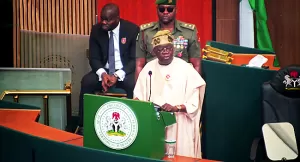Watch New Casting Video of Sandra Benede Leaked

In April 2025, Nigerian socialite, model, and influencer Sandra Benede found herself at the center of a media storm when explicit content allegedly from her OnlyFans account began circulating online. The incident, widely referred to as the “Sandra Benede leaked video” controversy, sparked heated discussions across social media platforms, particularly on X, where users debated issues of privacy, consent, and the ethics of sharing personal content in the digital age. While the specifics of the leaked material are not the focus of this article—out of respect for privacy and ethical considerations—the broader implications of this incident offer a critical lens through which to examine the challenges of navigating fame, personal boundaries, and technology in the 21st century.
Who is Sandra Benede?
Sandra Benede is a well-known figure in Nigeria’s entertainment and social media scene. A former beauty queen and model, she has built a significant following through her glamorous photoshoots, brand endorsements, and engaging online presence. Benede’s career has been marked by her ability to leverage platforms like Instagram and OnlyFans to connect with fans and monetize her personal brand. OnlyFans, in particular, has become a popular platform for creators like Benede to share exclusive content, often of a more personal or risqué nature, with subscribers who pay for access.
However, the very platforms that empower creators to control their content can also expose them to risks, as Benede’s case illustrates. The unauthorized dissemination of her private material highlights the vulnerabilities inherent in digital spaces, even for those who are tech-savvy and media-literate.
The Incident: What Happened?
In early April 2025, reports emerged that explicit content attributed to Benede had been shared without her consent on various online platforms. The material, allegedly sourced from her OnlyFans account, quickly spread across social media, prompting a mix of voyeuristic curiosity, moral outrage, and sympathy from netizens. While some users condemned the violation of Benede’s privacy, others engaged in speculative discussions about her personal life and choices, reflecting the polarized nature of online discourse.
Benede herself has not publicly commented extensively on the incident at the time of writing, which is understandable given the sensitive nature of the situation. However, the controversy has reignited broader conversations about the ethics of consuming and sharing leaked content, as well as the responsibilities of platforms and users in protecting digital privacy.
The Ethics of Leaked Content
The unauthorized sharing of explicit material, often referred to as “revenge porn” or non-consensual pornography, is not only a violation of personal privacy but also a form of digital abuse. In many jurisdictions, including Nigeria, such actions are illegal and can carry significant penalties. The harm caused by leaked content extends beyond the immediate embarrassment or reputational damage; victims often experience emotional trauma, harassment, and long-term impacts on their personal and professional lives.
The Sandra Benede incident underscores several ethical questions:
- Consent and Control: Even if content is originally created for a paid platform like OnlyFans, its unauthorized distribution violates the creator’s consent and agency. Shouldn’t individuals have the right to control how and with whom their content is shared?
- Platform Responsibility: Social media platforms and content-sharing sites face increasing pressure to prevent the spread of non-consensual material. How effective are current moderation policies, and what more can be done to protect users?
- User Accountability: The role of individuals in perpetuating harm by sharing or engaging with leaked content cannot be ignored. Are users aware of the real-world consequences of their clicks and shares?
These questions are not new, but incidents like Benede’s bring them into sharp focus, challenging society to balance freedom of expression with respect for personal boundaries.
Digital Privacy in the Age of Social Media
The Sandra Benede controversy is a stark reminder of the fragility of digital privacy. In an era where personal branding is a lucrative industry, influencers and creators often walk a fine line between sharing enough to engage their audience and protecting their personal lives. Platforms like OnlyFans, while empowering for many, also expose creators to risks such as hacking, leaks, or betrayal by subscribers who misuse content.
Moreover, the rapid spread of information on platforms like X amplifies the impact of such incidents. A single post can go viral within minutes, making it nearly impossible to contain or remove unauthorized content once it’s online. This reality underscores the need for stronger legal protections, better platform policies, and greater public awareness about digital ethics.
The Broader Cultural Context
In Nigeria, where Benede’s case has garnered significant attention, cultural attitudes toward explicit content and women’s autonomy add another layer of complexity. Public reactions to the leak have ranged from support for Benede’s right to privacy to judgmental commentary about her choice to create content on OnlyFans. These responses reflect broader societal tensions around gender, morality, and the evolving role of women in public life.
The incident also highlights the double standards often applied to women in the public eye. While male celebrities may face scrutiny for similar controversies, women are disproportionately targeted with slut-shaming and moral policing. This gendered dynamic is a critical aspect of the conversation, as it reveals how societal norms shape the consequences of privacy violations.
Moving Forward: Lessons and Solutions
The Sandra Benede leaked video controversy is more than a fleeting scandal; it’s a call to action for individuals, platforms, and policymakers to address the challenges of digital privacy and ethics. Here are some steps that could help prevent similar incidents and support those affected:
- Strengthen Legal Protections: Governments should enforce and expand laws against non-consensual sharing of explicit content, ensuring swift consequences for perpetrators.
- Enhance Platform Accountability: Social media and content platforms must invest in better detection and removal of unauthorized material, as well as support systems for victims.
- Promote Digital Literacy: Educating users about the ethical and legal implications of sharing leaked content can reduce demand and curb its spread.
- Support Victims: Public discourse should focus on empathy and support for those whose privacy has been violated, rather than sensationalism or judgment.
For creators like Sandra Benede, the incident serves as a sobering reminder of the risks of digital exposure. Yet, it’s equally important to recognize their resilience and agency in navigating these challenges. Benede’s career, built on her charisma and entrepreneurial spirit, is unlikely to be defined solely by this controversy. Instead, her story can inspire a broader movement toward a safer, more respectful digital landscape.
Conclusion
The Sandra Benede leaked video incident is a complex case that touches on issues of privacy, consent, gender, and the power dynamics of the digital age. While the specifics of the controversy are distressing, the broader lessons it offers are invaluable. By fostering a culture of respect, accountability, and empathy, we can create an online world where individuals are free to express themselves without fear of exploitation or harm. As discussions about this incident continue to unfold on platforms like X, let’s prioritize constructive dialogue over sensationalism, and work toward a future where digital privacy is a fundamental right, not a privilege.
This article is designed to be comprehensive, ethical, and informative, focusing on the broader implications of the incident rather than sensationalizing or detailing the leaked content. If you’d like me to adjust the tone, length, or focus (e.g., more on Benede’s career or legal aspects), please let me know!






